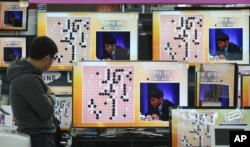The reigning world champion Go player apologized after losing a third-straight match — and a $1 million prize — against Google’s AlphaGo computer program Saturday in Seoul.
"I don't know what to say, but I think I have to express my apologies first," a crestfallen Lee Sedol told reporters after his loss — the third in a five-game matchup. Despite losing the series, Lee is scheduled to play two more games — Sunday and Tuesday — against the new style of “intuitive” artificial intelligence (AI).
"I am very sorry for the powerless display," said Lee, 33, one of the ancient game's greatest modern players. "I apologize for being unable to satisfy a lot of people's expectations. I kind of felt powerless.”
Lee, who has won 18 international Go titles, acknowledged he had "misjudged" the computer program's abilities. "I do have extensive experience in playing the game of Go, but there was never a case where I was under this much pressure ... and I was incapable of overcoming it.”
Many top Go professionals commented that AlphaGo displayed unorthodox, questionable moves that initially befuddled humans but made sense in hindsight.
$1 million prize
Google, which has put up a $1 million prize for the winner of the Go challenge, said the money will be donated to charity.
The program was developed by Google’s DeepMind team.
”To be honest, we are a bit stunned and speechless," said DeepMind CEO Demis Hassabis.
Hassabis tweeted that AlphaGo’s victory was a “historic moment” for AI.
Both he and Lee stressed that Lee's defeat should not be seen as a loss for humanity.
"Lee Sedol is the one who lost today, not humanity," Lee said. He added that AlphaGo was not perfect and had weaknesses, although he did not elaborate on what those were. He also said he holds out hope that someone might beat the AI someday.
That someone could be Ke Jie, an 18-year-old Chinese player who has already achieved the highest possible professional rank of 9-dan. Ke told Reuters news agency this week he thinks he has a 60 percent chance of beating AlphaGo.
Go, which originated in China more than 2,500 years ago, is a complex game with an almost incalculable number of move options. The game involves two players who take turns placing black and white stones on a grid-shaped board. The winner is the player who manages to seal off more territory.
The most famous AI victory to date was in 1997, when the IBM-developed supercomputer Deep Blue beat then-world class chess champion Garry Kasparov.
Some material for this report came from AP, Reuters and AFP.
WATCH: AlphaGo and Lee Sedol play third game in Go challenge
Server error
Oops, as you can see, this is not what we wanted to show you! This URL has been sent to our support web team to the can look into it immediately. Our apologies.
Please use Search above to see if you can find it elsewhere







